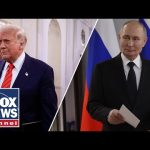In a world where threats from Russia, Iran, and China loom larger by the day, U.S. National Security Adviser Michael Waltz has emphasized the importance of NATO allies stepping up their defense spending. During a recent discussion, he highlighted the commitment of the United States to Article 5 of the NATO treaty, which assures that an attack on one ally is an attack on all. This assurance, however, comes with a stern reminder: Europe needs to increase its military expenditures. The pressure is on to ensure that American resources can focus on the rising threats in the Indo-Pacific, signaling that while Uncle Sam is still there to help, he expects his friends to chip in with their fair share.
The NATO Secretary-General visited the White House recently and voiced a pressing concern: with the United States bolstering its military presence in the Pacific, Europe must pull up its socks and do its part in defense spending. This is crucial as threats from across the globe do not take a break. The U.S. is ready to support its allies, but the expectation is clear; if the partnership is going to survive, Europe needs to step up to the plate financially. It appears that a collective effort is necessary, especially given that NATO allies have been recognized for not fully realizing their financial commitments to defense.
In an age where every dollar counts, the call for increased spending is more pertinent than ever. The U.S. Ambassador to NATO, Knew Whitaker, remarked that European allies need to do more than simply meet the 2% GDP requirement for defense spending. Whitaker conveyed the urgency of the situation, noting that the world is too dangerous to sit back and relax. The historic summit set to take place in June in The Hague is expected to be a turning point. The message from the U.S. is clear: it’s time to turn talk into action.
On the economic front, there is also concern about the trade imbalance between the United States and Europe. It has been stated that Europe has a significant trade surplus with America, nearly $250 billion. Such numbers simply do not add up in a fair trade game. Thus, increasing defense spending isn’t just about bullets and tanks; it’s also about ensuring that the economic scales are balanced. The U.S. wants fair trade deals that operate in the best interest of American families and workers, aligning perfectly with the America First agenda championed by Donald Trump.
As these discussions unfold, it appears that the diplomatic landscape is buzzing with activity. President Trump is reportedly working on crafting a peace deal between Ukraine and Russia, all while managing the intricacies of international trade negotiations. Trump’s unique deal-making style is intended to prioritize agreements that will favor the American economy while strengthening alliances and bolstering defenses. With the stakes this high, there’s no doubt that both the U.S. and its allies have their work cut out for them, but as Americans know well, teamwork is the backbone of success – whether on the battlefield or in the boardroom.




